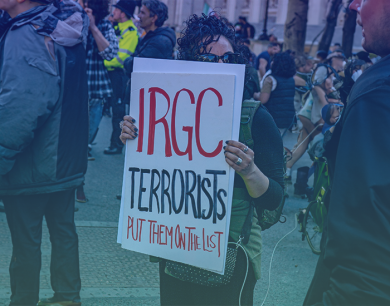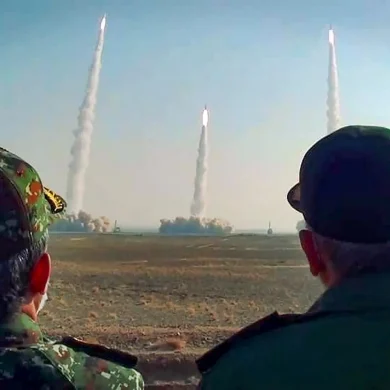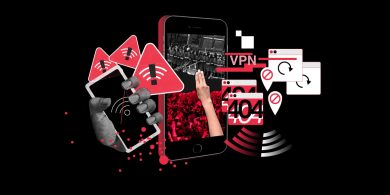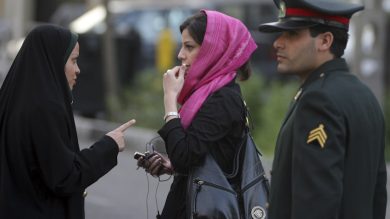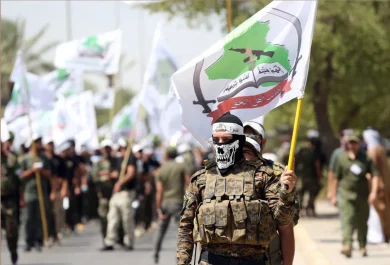The Islamic Revolutionary Guard Corps (IRGC) is not just a military force—it is the financial engine behind some of the most dangerous terrorist networks in the world. From proxy wars in the Middle East to assassination plots abroad, the IRGC’s operations are expensive, sophisticated, and global in scope. But how does it pay for them?
The IRGC’s ability to fund global terrorism lies in its vast and opaque financial empire—an empire built on state control, corruption, illicit trade, smuggling, and a web of front companies. To understand how the IRGC operates, we must follow the money. This article exposes the financial architecture of the IRGC and shows why cutting off its funding is key to defeating its influence.
1. The Financial Empire of the IRGC
The IRGC’s economic power is immense. Over the past two decades, it has transformed from a military organization into an economic conglomerate with deep roots in nearly every sector of Iran’s economy.
Key Sectors Under IRGC Control:
• Construction
• Oil and Gas
• Telecommunications
• Mining
• Banking and Finance
• Imports and Exports
• Black Market Trade
This economic control allows the IRGC to generate billions in revenue, much of it off the books and shielded from oversight. These funds are then funneled into terrorism, military adventurism, and political repression.
2. Khatam al-Anbiya: The IRGC’s Economic Arm
At the heart of the IRGC’s financial network is Khatam al-Anbiya Construction Headquarters, the IRGC’s engineering and construction conglomerate. With over 800 affiliated companies, it is one of the largest contractors in the Middle East.
Projects Include:
• Oil pipeline construction
• Metro systems
• Dam and road projects
• Telecommunications infrastructure
While these projects are ostensibly civilian, they serve dual purposes: laundering money, funding terror, and embedding the IRGC deep within Iran’s civilian and financial sectors.
Khatam al-Anbiya has been sanctioned by the U.S., EU, and Canada for financing terrorism.
3. Shell Companies and Front Businesses
The IRGC uses an extensive network of front companies, often disguised as legitimate businesses, to move money internationally, evade sanctions, and finance its operations covertly.
These companies operate under civilian names but are ultimately controlled by the IRGC, often through former or current commanders serving on corporate boards.
Common Sectors for Front Companies:
• Shipping and maritime
• Oil and petrochemicals
• Precious metals and mining
• Technology and cybersecurity
• Investment firms
A leaked 2020 report by Iranian whistleblowers revealed dozens of these shell companies operating in Europe, Asia, and Latin America.
4. The Role of the Quds Force
The IRGC’s Quds Force is tasked with extraterritorial operations—including terrorism, intelligence, and covert financing. It maintains its own financial apparatus that overlaps with Iran’s diplomatic missions, embassies, and religious foundations abroad.
Financing Methods:
• Cash smuggling across borders
• Hawala networks (informal money transfers)
• Charitable organizations and NGOs as fronts
• Gold and cryptocurrency exchanges
The Quds Force often works in partnership with sympathetic banks or corrupt regimes to launder funds and pay militant groups such as Hezbollah, Hamas, the Houthis, and Shiite militias in Iraq and Syria.
5. Oil Smuggling and Sanctions Evasion
Despite international sanctions on Iran’s oil exports, the IRGC has mastered the art of oil smuggling.
How It Works:
• Ghost tankers turn off transponders to avoid detection.
• Ship-to-ship transfers are conducted in international waters.
• Flag-switching disguises Iranian tankers under foreign identities.
• Shell buyers in China, Venezuela, and Syria use front companies to pay.
Revenue from these operations bypasses Iran’s official central bank and goes directly to IRGC-controlled accounts, enabling them to finance terror while the Iranian people suffer economic hardship.
6. Criminal Networks and Black Market Trade
The IRGC engages directly in illicit trade, including:
• Weapons trafficking
• Drug smuggling (notably opium and methamphetamine)
• Cigarette and alcohol smuggling
• Stolen antiquities and cultural goods
In many regions, particularly along Iran’s borders and in conflict zones, the IRGC operates like a state-sponsored cartel, working with organized crime to generate cash and maintain control.
This criminal economy also gives the IRGC influence over vulnerable communities and routes critical to terrorist logistics.
7. Hezbollah: The IRGC’s Top Investment
Among the IRGC’s many terrorist beneficiaries, Hezbollah in Lebanon receives the lion’s share of financial and logistical support.
IRGC-Hezbollah Financial Links:
• Direct funding through cash smuggling and bank transfers
• Weapons shipments and training support
• Real estate investments in Lebanon, Syria, and Africa
• Laundered money through Latin America (e.g., Venezuela and Brazil)
Hezbollah has been implicated in global criminal networks—including drug trafficking in South America, money laundering in West Africa, and financial fraud in Europe—all with backing or oversight from the IRGC.
8. Use of Religious Institutions and Charities
The IRGC exploits religious foundations (bonyads) and charitable trusts to disguise terror financing.
These organizations enjoy tax exemptions and legal protections in Iran but are often used to:
• Collect donations from the public
• Funnel money to armed proxies
• Obscure financial transactions through religious or cultural programming
Some mosques, madrassas, and Shia centers abroad also serve as fronts for financial activity linked to the IRGC.
9. Cyber Finance and Cryptocurrency
In response to tightening sanctions, the IRGC has increasingly turned to cyber operations and cryptocurrency as tools for fundraising and money laundering.
• Crypto mining farms: Many of Iran’s mining operations are controlled by IRGC affiliates.
• Digital wallet scams: Used to extort or defraud foreign targets.
• Hacked banking credentials: Sold on the dark web or used to finance terror operations.
U.S. federal prosecutors have linked several cryptocurrency wallets directly to IRGC-Quds Force operations, showing an evolution in how terrorism is financed in the digital age.
10. IRGC-Controlled Banks and Institutions
Several Iranian banks are effectively run or heavily influenced by the IRGC, giving them the ability to:
• Manipulate currency exchange
• Move money across borders
• Conceal illicit transfers
• Fund IRGC pensions, projects, and proxies
Notable examples include:
• Bank Sepah (sanctioned)
• Melli Bank
• Ansar Bank (IRGC-linked)
• Mehr Bank
These institutions are critical nodes in the IRGC’s financial architecture, acting as hubs for both domestic repression and international terror.
11. Foreign Partnerships and Rogue States
The IRGC thrives through relationships with rogue regimes and blacklisted entities:
• Syria: Uses IRGC to pay for military hardware and subsidized oil.
• North Korea: Collaborates on missile development and military tech.
• Venezuela: Exchanged oil, gold, and cyber expertise.
• Russia: Provided drones and ammunition in exchange for diplomatic and financial backing.
These partnerships form a shadow axis of authoritarian finance, where terror, war, and profit intersect.
12. Impact of Sanctions—And Their Loopholes
Sanctions against the IRGC and its subsidiaries have slowed, but not stopped, its financing operations.
Key Loopholes:
• Lax enforcement in certain jurisdictions
• Failure to blacklist front companies quickly
• Inadequate international coordination
• Inability to trace cryptocurrency wallets
• Hesitation from some governments to fully designate the IRGC as a terrorist entity
Without a unified international framework, the IRGC adapts faster than regulators can respond.
13. Real-World Costs of IRGC Financing
Every dollar that flows into the IRGC’s financial empire translates to real-world suffering:
• Bombs dropped on Syrian neighborhoods
• Ballistic missiles launched at civilian airports
• Assassination plots in European cities
• Political prisoners tortured and executed
• Children dying in proxy war zones
This isn’t abstract finance—it’s blood money. It’s terror subsidized through loopholes and apathy.
14. Pathways to Financial Disruption
To dismantle the IRGC’s financial empire, governments and institutions must:
1. Designate the IRGC as a terrorist organization in full (not just the Quds Force).
2. Blacklist and sanction all IRGC-affiliated companies and banks.
3. Track and regulate cryptocurrency flows linked to Iranian operatives.
4. Disrupt money laundering networks in Latin America, West Africa, and Europe.
5. Coordinate with tech platforms to shut down cyber scams and digital fundraising.
Conclusion: Cut the Funding, Weaken the Terror
The IRGC’s terror operations depend on their ability to generate and launder money. Every financial transaction, no matter how hidden, feeds a network of repression and violence that spans continents.
Join Our Newsletter!
Stay informed with the latest updates, news, and ways to take action in the fight for justice and global security. Sign up now to get updates delivered straight to your inbox!

